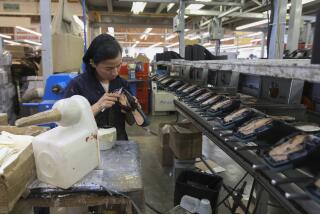Passage of South Korea, Colombia, Panama trade pacts is expected
President Obama is poised to get at least one key element of his economic agenda through Congress by moving three long-disputed trade agreements to lawmakers after securing assurances that House Republicans would back a separate measure to help displaced workers, an issue that had held up the trade pacts.
Passage of the agreements with South Korea, Colombia and Panama is expected to come as soon as next week, and could produce $13 billion in additional U.S. exports each year of farm, machinery and other goods and services, according to White House officials.
The deals are likely to bring the biggest benefit to trade-reliant states such as California and Washington.
Obama administration officials said Monday that the three trade deals would support “tens of thousands of jobs,” but outside experts cautioned that they don’t expect a significant boost to American employment in the near term.
The pacts could help Obama meet his goal of doubling U.S. exports in five years and bring a rare bipartisan agreement in a divided Washington. It also would end several years of political wrangling over so-called free-trade agreements.
Similar trade pacts were first signed in President George W. Bush’s last administration but were bitterly opposed by organized labor and some Democrats. Additional deals were delayed, in part, because of a dispute in Congress over aid to workers who lose their jobs because of foreign competition.
Democrats largely support the trade-related assistance program for workers, but Republicans have criticized its cost.
Obama praised the free-trade deals as important for the economy, but he said Republican lawmakers also should consider the $447-billion package of tax cuts and spending that he proposed a month ago.
“I’m glad that’s an area of bipartisan agreement,” Obama said of the trade pacts in an interview with ABC News. “But it’s not enough by itself. There’s more that we can do.”
House Republicans have said they will consider the tax cuts in Obama’s jobs plan as well as the free-trade agreements. The White House had been holding back on the trade deals until the Senate approved the program to train and help displaced workers. That approval came last month.
Business leaders have put pressure on Republicans to approve the trade deals, and GOP leaders were eager to show they could work with the White House. Congress saw its popularity plummet after the summer’s bruising budget battles.
“Today we have overcome a crucial hurdle to helping put Americans back to work,” said House Speaker John A. Boehner (R-Ohio). “Now that all three agreements have been transmitted, they will be a top priority for the House.”
A quick vote would help South Korean President Lee Myung-bak, who is scheduled to meet Obama in Washington next week. The South Korean deal is the most substantial of the three pacts, opening overseas markets not only to popular American beef but also to professional services in law, finance and accounting.
It also widens U.S. diplomatic ties with the Asia-Pacific region at a time when China is a rising political force.
The benefits to the U.S. may not be as apparent because it will take time for many American companies to take advantage of the increased access to foreign markets.
In the short term, the advantages may lie more with the three trading partners, especially South Korea, which is expected to move quickly to capitalize on the opportunity to expand its existing penetration of the U.S. auto and electronics markets.
Senior diplomats from South Korea, Colombia and Panama praised the trade deals, as did such business groups as the U.S. Chamber of Commerce.
“With a stagnant economy and unemployment still above 9%, these three agreements will provide our economy with a much-needed economic boost to create jobs,” said Jay Timmons, president of the National Assn. of Manufacturers.
Labor activists have disputed claims that free-trade agreements generate significant economic benefits to U.S. workers. And liberal Democrats remained highly suspicious of the new pacts, saying they contain more giveaways to corporations at the expense of U.S. jobs.
The trade pacts are “the last thing American workers and our economy needs,” said Rep. Dennis Kucinich (D-Ohio).
White House officials defended their decision to use the free-trade deals as leverage for an agreement on assisting displaced workers. After months of talks, the House Rules committee Monday announced that it would consider a measure renewing the Trade Adjustment Assistance and the Generalized System of Preferences.
That gave the administration enough “comfort” to send the agreements to the Hill, said an administration official who was not authorized to speak, briefing reporters on condition of anonymity.
Boehner promised that the bills would be considered “in tandem” — a gesture designed to appeal to Democrats.
“We welcome the president’s action to help get our economy back on track, get people back to work and put our country on even footing with our foreign competitors,” said House Majority Leader Eric Cantor (R-Va.).
Times staff writer Christi Parsons in Washington contributed to this report.








